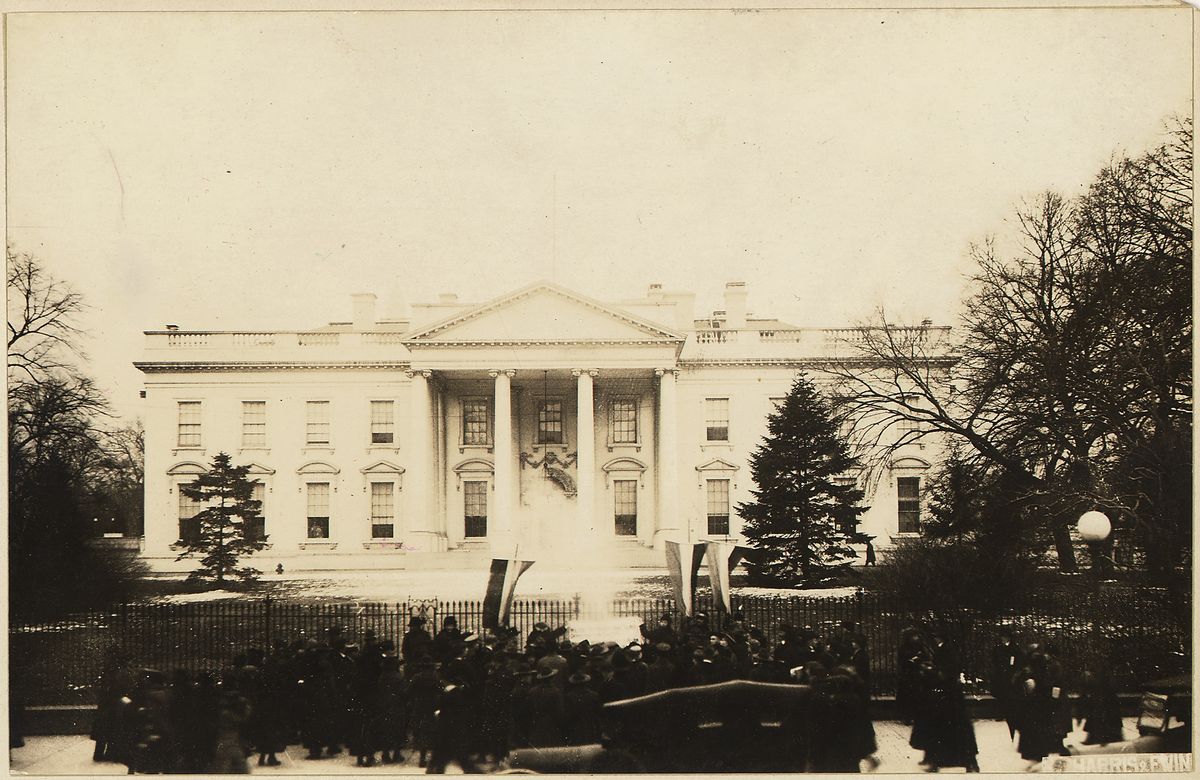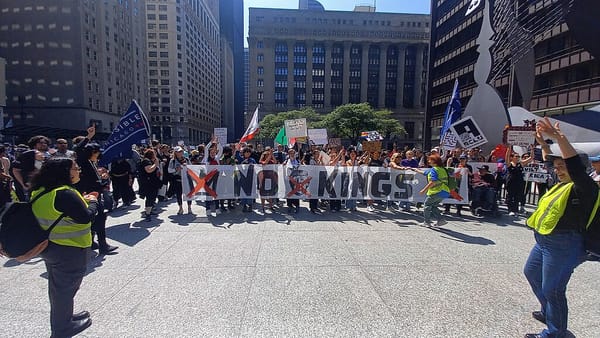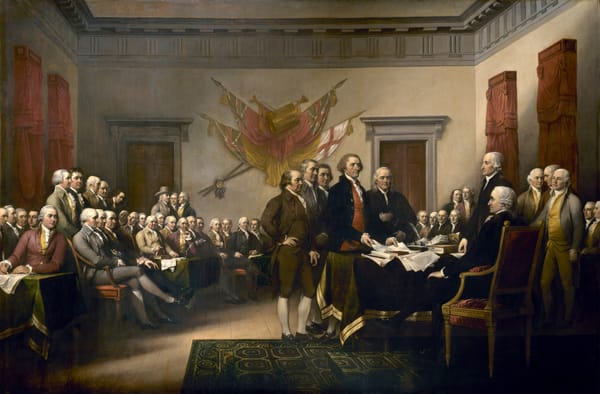Democracy Strikes Back

No modern defense of democracy needs to rely solely on first principles. Unlike our liberal forebears who struggled to constrain the arbitrary and expansive powers of kings and aristocrats, we know that representative, constitutional democracy works. The hockey-stick plot of per capita income over the centuries that the economic historian Deirdre McCloskey refers to as the Great Enrichment—and what I like to call the Capabilities Explosion—was started and sustained with the spread of liberal ideas, including those of representative government. Democracies famously avoid famines, and typically avoid going to war with one another. But democracies also improve economic growth and a number of other indicators of human well-being, like health and education. This should be the backdrop for any discussion about the “failures of democracy.” Whatever arguments are deployed to show that voters are ignorant and irrational must confront these conspicuous correlations.
Nonetheless in the age of Brexit and Trump, democracy has taken some blows in terms of liberal credibility. It’s worth reconsidering the reasons why democracy is essential to the liberal worldview. Before doing this however, I should clarify exactly what it is I’ll be defending and what I won’t be. By “democracy” I mean a system of representational government where representatives are chosen by voters according to wide suffrage on the principle of one person, one vote. This representative government is coupled with a constitution—written or unwritten—which provides procedural rules and otherwise constrains the authority of the elected representatives; it is amendable, but not easily so.
By democracy I do not mean simple majority rule. Nor do I mean fetishizing referenda. Voters should elect representatives to do the work of government, and elections should provide stable and predictable opportunities to replace those representatives. The establishment of independent, technocratic bodies (e.g., the judiciary or central bank) is consistent with democratic principles as long as those doing the appointing are accountable to voters. Acknowledging that much government work is technocratic in nature, and the voters have no expertise in these matters, is common sense and not necessarily undemocratic.
In this essay I will argue that democracy is consistent with the essential requirements of a liberal government and that democracy is ethically and even epistemically superior to a close alternative, the now fashionable “epistocracy.”
The basic liberalism of democracy
In part liberalism is about figuring out how best to reap the benefits of living together in a large, diverse society instead of living on one’s own or in smaller, closed groups. But living in a large society of strangers requires coordinating on a set of rules. Knowledge of the rules and expectation that the rules will be followed maintains the order that gives the large society its value; without rules that allow for coordination of actions, a mass of people with diverse interests is just a chaotic mass of people. Coordinating on such a set of rules is the necessary and essential point of politics. Democracy respects the individual by granting them a voice in the essential social project of coordinating on a set of rules that impacts everyone.
Coercion is an unsavory but unavoidable aspect of living with other people. This is partly because human nature suggests whatever social rules obtain will be broken sometime somewhere by individuals seeking selfish advantage. But the more fundamental point is that many of our social rules themselves involve coercive limits to liberty. Private property, for example, imposes limits on an individual’s freedom to interact with the world, and these limits are ultimately backed by physical threats. I am coercively prevented from using your property as I see fit. To take another mundane example, it’s arbitrary whether we coordinate on driving on the left or right side of the street, but once we have settled on (say) the right side, we are constrained to limit ourselves to the right, and we are justified in preventing an intransigent left side driver from driving on their preferred side, by force if necessary. Democracy respects the individual by giving them a voice in how the coercive apparatuses of society are organized and deployed.
Thus democratic procedures have intrinsic—and not merely instrumental—value. Without the option to participate in crafting the rules governing society, an individual is a mere political object—subordinated to their political betters—and not a political subject with agency. It’s certainly difficult to argue such persons could be the social equal of those who do craft the rules. This intrinsic value suggests any tampering with core political rights like voting (and the freedoms of speech, association, and assembly, with public offices formally open to all comers) must overcome a presumption in favor of political liberty. It’s possible to surmount this presumption. If I was unable to refer to the overwhelming empirical victories of human well-being then this hurdle would certainly be lower. And it’s possible in principle that some other social organization could improve on substantive outcomes over democracy. But suffrage should be universal by default.
The epistocratic challenge
It’s commonly objected that the right to vote is purely symbolic because the probability that any given individual’s vote will be decisive in an election is vanishing, and thus the outcome is indifferent to their voting versus abiding on the sofa. Thus, the argument goes, for all practical purposes the typical citizen is still subordinate to those with political power. The individual has no “right” to vote on their government, and no injury is done to them if government decision-making is restricted to some elite, provided it is shown that some social gain can be achieved by such restriction. This is the argument of modern critics of democracy who favor “epistocracy,” or rule of knowers.
It’s true that any individual’s vote will virtually never be decisive, but this just owes to the large populations involved in modern democracies. In a population of 10 people who all purport to respect one another as free and equal citizens, the notion that one of the 10 should have no vote—no formal say—on the coercive institutions of the group while the other nine did enjoy such a vote would seem blatantly disrespectful of the odd one out. Indeed the nine would be at pains to persuade the one to stay with the group instead of defecting.
Of course the disanalogy arises that effective political power diminishes as the population grows, and the epistocrat can reasonably suggest that populations of different scales need different kinds of government. But the optics will always remain. The disenfranchised will live amongst the enfranchised, and will be reminded of their difference every time conversations around the water coolers and social media threads turn to politics, and every time political news airs on the television or radio. The epistocrat might respond that this feeling of being left out is in principle no different than conversations turning obsessively to sports for the person with no particular interest in the topic. This will likely be a good comparison for some disenfranchised citizens, but others may feel more like being the person of modest income surrounded by rich folks discussing their yachts and Ferraris; or they may feel like the romantic unfortunate on Valentine’s Day. There is some latitude in how both the disenfranchised person and those around them feel about their distinction. This interpretive latitude represents a stability problem for epistocracy, as there are both psychological mechanisms (our tendency to key in on our differences) and political forces tending toward portraying the disenfranchised as sufferers of injustice (consider the grand suffragist narrative). This seems unstable relative to the “one person, one vote” principle, which has intuitive appeal and a kind of magnetic stability: its universalism pushes us to see more and more people as citizens, and it gives everyone at least symbolic buy-in to the system.
The lesser status the disenfranchised feel may simply be the cost of providing better government, but this should be recognized as a real cost rather than dismissed as mere symbolism. One may fantasize about a society in which politics just isn’t that important to the average person, but even in the best case such a society would have to be substantially more just so that the average person had no fear of sudden loss of expected entitlements, of losing a loved one to state violence or incarceration, of deportation, of rights to privacy and reproductive freedom, of freedom to practice their faith, etc. In other words, politics will always be seen as important—and thus loss of even symbolic political rights will warrant umbrage—as long as people have something substantial to lose in the political arena.
That’s the best case where we imagine it’s possible to eventually remove fear of loss from politics. The more realistic scenario realizes that reasonable people come to divergent conclusions about political questions even when engaging in good faith dialogue. Even the most just society will always feature high-stakes, irreconcilable disagreement and we will always have something to lose. This suggests there will always be a motivating force to view politics as important, and political inequality—however symbolic—as something to be avoided. Clearly the universal franchise doesn’t eliminate inequality in political power, but no system in history has ever achieved social equality. Restricting the franchise moves in the direction of less rather than more social equality.
This understanding of individual voting is also simplistic. Voters organize themselves into groups and vote en masse. We vote cooperatively to achieve cooperative aims. Pointing out that a voter can “achieve” the same goals by neglecting to vote is no more interesting than pointing out any other opportunity to free ride on the collective action of others. (Similarly, I can achieve roughly the same environmental quality by continuing to pollute since my actions will be inconsequential against the aggregate actions of my neighbors). Individuals belong to identity groups—often whether they would like to or not—and they derive individual benefits from the collective well-being of those identity groups. The historical facts of identity-based social and economic inequality suggest that collective aims advanced through political agitation, including voting, will often serve the substantive aims of individual group members. This is true even if some specific members may demur from these perceived advances (consider a conservative Christian woman who believes women should stay out of public life). It seems clear that in general the social advances of women as a group has expanded the capabilities of the typical woman, and the same can be said for other historically oppressed classes.
The epistocratic theorist Jason Brennan grants that the franchise can empower “large collections of individuals,” but insists this doesn’t mean individuals themselves are thereby empowered (all emphases Brennan’s):
If we deprive all black people of the right to vote and run for office, then this will help facilitate people of other races in exploiting, dominating, and oppressing blacks. Yet this doesn’t show that it’s valuable for any individual black person to possess the political liberties or participate in politics. Instead, at most it demonstrates that it’s valuable to each black person that a sufficient number of black people possess the political liberties. Because individual votes and individual participation almost never matter, a black person should be nearly indifferent between situations A and B:
- All black people except an individual have the political liberties.
- All black people (including the individual) have the political liberties.
If A isn’t enough to stop the individual black person from being dominated, then, except in unusual circumstances, neither is B. The political liberties and political participation may very well empower a group of which I am a part, but it doesn’t follow that they empower me.
Empowering people like me to vote tends to protect me only if the people like me tend to vote in ways that protect me. I am a member of many different groups; there are many different overlapping groups that qualify as people like me. Some of these groups are large, while others are small. Some of these groups tend to vote in groupish ways (i.e., membership in that group turns out to affect voter behavior), while others do not. Whether the voting behavior of a group tends to protect or promote individuals’ interests within that group is a complicated empirical question. We don’t want to gloss over it by imagining that empowering everyone within a group to vote protects that group. After all, that depends on how they vote, including whether they are well informed enough to vote in ways that protect their interests. It also depends on how others outside the group vote, including whether they vote to harm other groups or not.
In the end, it seems false that I need the political liberties to prevent others from dominating and exploiting me. What prevents me from being dominated is that other citizens either choose to restrain themselves or are in some way restrained. If they decide to act badly, my rights to vote or run for office can’t stop them. The moral majority stops the unjust minority, the courts stop them, various procedural checks and balances stop them, or they stop themselves. Yet if tomorrow everyone in my country decides they want to interfere with me or subject me to their collective will, my political rights provide me no more protection than a bucket provides against a flood. [Against Democracy, Kindle location 1798]
There are a number of problems with this passage. First, disenfranchisement confers disrespect to the disenfranchised person as I’ve argued somewhat abstractly above. Brennan elsewhere carefully points out that in our present social understanding, rights to vote do as a matter of fact convey public respect and so disenfranchising a person does require justification. He just believes there’s nothing intrinsic to the right to vote to lead to the franchise-respect relationship and that we should try to move to a world where this relationship doesn’t hold. But this is armchair philosophizing to a dangerous fault. Democracy occurs in an historical social context, and in every real world case democracies have witnessed power struggles over who counts as socially deserving of the vote. Suffrage campaigns have always been part of bigger campaigns for marginalized groups to achieve social equality. This isn’t just a quaint historical footnote: as recently as 2016 the 4th Circuit Court struck down a North Carolina law because its provisions “target African Americans with almost surgical precision.”
None of Brennan’s epistocratic proposals suggest directly allocating the franchise according to race or sex. Yet even if epistocratic disenfranchisement is applied in a truly neutral way, it will disproportionately impact presently disadvantaged demographic groups whose members, because of present and legacy systemic oppression, will be less able to clear the epistocratic hurdles (whether these take the form of a voter civics test or poll tax or some other means). Moreover, any actual epistocratic proposals will go through deliberative bodies like the North Carolina legislature, who are likely to massage the details to their advantage. A move toward epistocratic governance would likely legitimize disenfranchisement as a political tool and we would likely see more of it done for unsavory reasons than we would for the enlightened reasons of sharpening the electorate.
Brennan attempts to address this fear by pointing out that the empirical evidence overwhelmingly suggests that people vote not to advance their own narrow self-interest but to advance the public interest as they genuinely understand it. Thus for example young people support social security even though the program effectively transfers wealth from the young to the old. I don’t dispute this, but it is also clear that a voter’s understanding of the public interest critically depends on who counts as the public. It’s often pointed out that racially diverse countries tend to have a less generous social safety net, and the usual explanation for this is that voters understand the public to mean people like them, and they often vote accordingly.
But even if the epistocratic elite voters hailing disproportionately from socioeconomic advantage could be expected to have the genuine interests of the disadvantaged and marginalized in mind, it’s not clear they would have the requisite knowledge. They may simply not understand or notice that public policies disproportionately impact say, women or people of color. It’s difficult for white people to know or understand that black men have much to fear in their interactions with the police. For most whites, the police feature as benign and helpful figures in the backgrounds of their lives. And it’s very easy for men to doubt the lengths women go to to avoid sexual harassment and sexual assault, and further the degree to which most women simply chin up and live with sexism. These groups and others can talk about their problems all they want, but if they were systematically weakened in the franchise they would be to the same degree even less likely to be heard and understood.
Brennan insists that an individual’s vote doesn’t matter, and that the only thing preventing domination is the restraint of those who would dominate. But the same individualist instrumental logic that insists an oppressed person shouldn’t care that they have been disenfranchised—because their lone vote doesn’t matter—also applies to the still enfranchised cognitive elites. Why vote against oppressive policies and bigoted authoritarian candidates for office when any individual’s vote will fail to make a difference?
My Liberal Currents colleague is correct: voting does have intrinsic symbolic power. The central point of democracy is to ensure the peaceful transition of power. Every vote is a vote in favor of democratic institutions. Brennan’s assault on democracy—which has enjoyed enthusiastic support among many of his libertarian followers, who incidentally often ridicule voting and take pride in abstaining from the ballot—etches away the social understanding that the individual’s vote is sacred. It etches away our belief that we can and should participate in collective political causes. If Brennan’s view of democracy gains ground in the popular understanding, then it may mean there is no moral majority around to stop the unjust minority.
Improving, not poisoning, democracy
I do not at all mean to convey that democracy is immune to critique. The problems of political ignorance, rational irrationality, and tribal polarization, among various cognitive biases, are all real. But the epistocratic approach is a non-starter. The legal scholar Ilya Somin brings similar allegations, yet he reaches a different conclusion: we should encourage greater competition among governing jurisdictions by embracing federalism, make it easier for more people to vote by foot instead of relying so much on political voice, and in general remove more facets of human life from the political nexus. This is an old and esteemed part of the liberal political program. Though as I’ve suggested above the political nexus will never empty entirely, it can nevertheless be reduced. Importantly, this is a political program, and it can and should take place within rather than against democratic institutions. We can argue for degovernmentalizing more areas of life without arguing against democratic politics altogether.
It’s worth considering potential reforms that lessen the damage done by political ignorance and irrationality. Brennan includes among his discussion of the varieties of epistocracy the idea of “universal suffrage with epistocratic veto.” The idea is that democracy would work just as before but there would be an additional body comprising some number of persons (maybe dozens, hundreds, or more) selected for general intelligence or some proxy for governing wisdom. This body is not itself legislative—it can write no bills of its own. It merely has the power to veto (say by reaching some supermajority agreement) certain laws passed by the legislature and perhaps some actions taken by the executive. This differs from the other proposals in that it disenfranchises no one. Indeed the Supreme Court of the United States in some of its capacities can be viewed as just such an epistocratic body. It is—as Brennan himself acknowledges—fundamentally democratic, albeit with an epistocratic twist.
I describe this proposal not because I necessarily believe it is the way forward, but because it takes the problems of political irrationality seriously without compromising democracy itself. It proves we can grapple with the shortcomings of democracy without trying to take away cherished, hard-fought political liberties and without disrespecting entire classes of citizens. It’s important to understand that democracy can be reformed without losing its democratic character. Representative democracy, which adds certain epistemic benefits as well as some “cooling off” delays in policymaking, can be thought of as a reform of direct democracy. Independent technocratic bodies (like a supreme court or central bank) are well understood to be acceptable institutions within democracies even though the officials are appointed rather than elected. (They’re still seen to be accountable to voters indirectly because their appointers are elected.) And of course constitutions aiming to protect the rights of individuals and minorities not only from the government but from the tyranny of an impassioned majority are seen as not only consistent with democracy but positively essential. The democratic theorist Hélène Landemore, author of Democratic Reason, suggests that we can view these innovations as the learnings of democracy. Democracies learn and adapt as they persist through time.
Democracy has limitations, but it is an essential component of a liberal society. The basic institution of “one person, one vote” is a straightforward application of liberal principles. It is universal and respects the moral equality of persons. It acknowledges the distinctness of individuals rather than assuming individual interests are subordinate to the race or class or religion they belong to. And it respects the fundamental diversity of individuals—of diverse motivations, projects, and understandings—in an obvious yet deep way. We think differently and we disagree. Yet it’s almost always worth living together in peace. Voting as equals allows us to live and vote another day.
Featured image is Suffragists at the the White House, Washington, District of Columbia. Harris & Ewing, Photographer (NARA record: 1123803)




